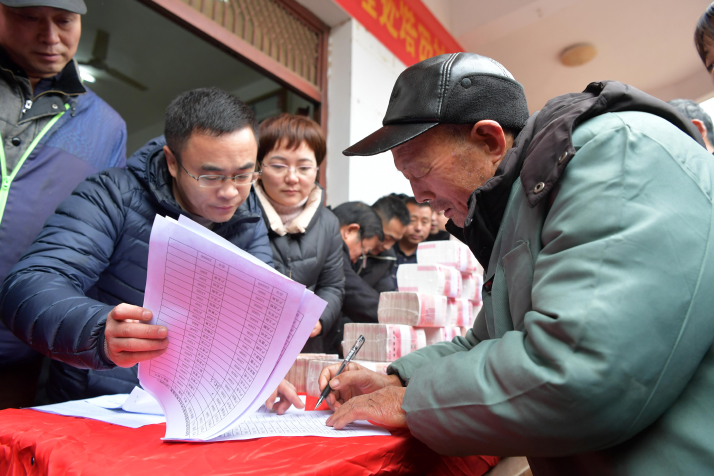| Voice |
| Quality Over Quantity | |
| Despite a growth rate slowdown, China's economic development is well-managed | |
|
|
 A farmer signs his name to get his dividends from a rural cooperative in Nanchang, Jiangxi Province in east China, on January 16 (XINHUA)
 Over the many years of accelerated economic growth in China, there has been a general tendency in many corners to fetishize GDP growth rates as paramount indicators of economic development. The simple logic of "bigger is better" has always been an easy sell to citizens and investors alike, and particularly in the wake of China's joining the WTO, it has been the story above all others, arguably, that has captivated international attention, along with the persistent concern that at some point, those rates would decline and then, perhaps, all bets would be off. Over the many years of accelerated economic growth in China, there has been a general tendency in many corners to fetishize GDP growth rates as paramount indicators of economic development. The simple logic of "bigger is better" has always been an easy sell to citizens and investors alike, and particularly in the wake of China's joining the WTO, it has been the story above all others, arguably, that has captivated international attention, along with the persistent concern that at some point, those rates would decline and then, perhaps, all bets would be off.More recently, of course, dramatic shifts in the international "China narrative" have focused on declining growth rates and particularly, the U.S.-China trade war. With a reinvigorated, better-disciplined and by many accounts more effective political system now in place, with the broader global perspective that China has "risen" and reached some sort of plateau of development that places it on par with other global powers, and with policy changes that have started emphasizing quality over quantity, concerns over declining growth rates quieted substantially. This has coincided with analyses indicating the U.S.-instigated trade war was hurting the U.S. more than China, and further, that the recent truce, the so-called phase-one resolution, reportedly favors the Chinese position more than the U.S., especially over the long term. For a long time, many viewed China primarily as a source of cheap labor, but it is well-understood those days are long gone. While there are still many concerns facing workers in China, and while Chinese labor is still attractive to domestic producers and international firms, the general trend is to find cheap labor elsewhere, as confirmed above all by outbound Chinese investment buying labor power in other nations. This is, of course, a positive development, one that correlates with reports that China has now crested the symbolic benchmark of $10,000 per-capita GDP. Nevertheless, even during the worst days of the trade war, as new data demonstrate, China still enjoyed positive inflows of foreign direct investment. Additionally, property prices nationally have held firm for the most part and many leading international analysts regard the economy as stabilizing. This has not stopped, nor should it stop, international media from reporting that China's GDP growth rate in 2019 was 6.1 percent, the slowest in 29 years, or that China's birth rate 10.48 per thousand in 2019, according to the National Bureau of Statistics, the lowest since 1952, despite allowing all couples to have two children in 2015. While these stories are sometimes presented in some international media as indicators of impending doom, in fact, the current situation appears both well-managed generally, and manageable over the longer term.  Children show off their artwork at an extracurricular painting lesson in Cixi, Zhejiang Province in east China, on January 13 (XINHUA)
Quality development What most global investors find captivating about China today is access to Chinese consumers. While consumer confidence has fluctuated in recent quarters, it has remained relatively strong, especially when compared with other countries. Furthermore, while the cyber retail revolution continues to undercut brick and mortar operations, and while consumption patterns and values, particularly among China's younger generations, are changing, most data indicate rates have softened but remained resilient. This is positive news for Beijing, especially given the more recent need to weather the trade war and the broader policy initiatives of driving future growth in part through efforts that increase domestic consumption. In fact, the aim to increase domestic consumption coincides with several policy objectives that remake economic development as a quality-oriented project. In some respects, these have direct implications for social justice, and correlate closely with China's aggressive poverty eradication efforts and countryside revitalization program. These policies along with others, including reforming "dragon heads"—large rural agribusiness companies—and creating new agribusiness cooperatives, as well as increased enforcements in major urban areas (especially residential and commercial zoning), appear to have contributed to push-pull incentives that are bringing migrants back home. These developments relieve pressures on cities where migrant labor is needed less than before, and it also helps address directly intersectional problems like "left-behind" children—children left to stay with relatives by parents working in faraway cities—and other quality of life issues facing hundreds of millions in the countryside. If a new consumption revolution arises in China, then it is not surprising if it is substantially less urban and more equitable than the previous one. Responsible stewardship It has been argued that the primary debate on political legitimacy in China since 1949, whatever specific claims or bases of assertion have been made in Beijing or by others, is whether China's political system, specifically under the leadership of the Communist Party of China, can effectively argue that it has been a responsible steward of the nation. This has become ever clearer under Xi Jinping's leadership, where guiding national rejuvenation and achieving the Chinese dream have intersected directly in domestic and international affairs in a myriad of ways. At the same time, it can be argued that China's political system, while explicitly stability-oriented, has profound crisis-seeking tendencies. These emerge in part because China's political system emerged as a solution to crises and often realizes its full potential when faced with crises. Historically, in the modern period, many of these crises had the beginnings with foreign aggression, and while many of these concerns have been mitigated with China's rise, international risks will never disappear completely, as the trade war exemplifies in part. But some of these dangers are more directly Beijing's responsibility. For example, Xi's anti-corruption campaign along with the drives to improve governance and the rule of law can be understood as generally progressive developments as well as responding to the crises caused by corruption. While the Party has claimed remarkable progress on these fronts, the question is whether these solutions may spur new concerns: whether new rules stifle innovation and development in some areas, or whether it will undercut still nascent efforts to embark on substantial reforms of state-owned enterprises. China in 2020 On the whole, however, optimism is reasonable. While China observes the same New Year's Day that others in the world do, for many Chinese, 2020 really begins on January 25, when the Chinese New Year celebrates the rat's return. The first year of the Chinese zodiac, it is frequently associated with a new beginning and increased potential for auspiciousness, especially economically, and in contrast with the Year of the Pig, which always precedes it. Beyond mythology, 2019's Year of the Pig was indeed a challenging year for China, and of course, somewhat ironically, the problems associated with pork production linger. There are new concerns with the new coronavirus first noticed in Wuhan, and likewise over the substance and durability of the first phase ending of the trade war. But in fact the broader picture is looking better than it did, and this is good news for a country preparing to recognize having reached the threshold of establishing a xiaokang or moderately prosperous society by 2020. Much will be made of these developments in the coming months and well they should. The key will be to continue responsible leadership and stewardship, temper overreaching, and whenever possible, avoid or resolve conflicts at home and abroad with the aims of peace, progress and productivity. The author is professor of politics and director of the International Graduate Program in Politics at East China Normal University in Shanghai Copyedited by Rebeca Toledo Comments to liuyunyun@bjreview.com |
|
||||||||||||||||||||||||||||||
|
